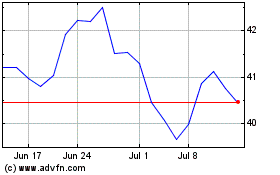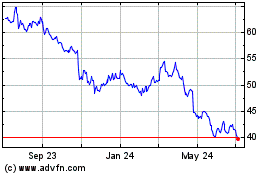Cancer Survivors Need More Efficient Integrated Long-Term Care & Stronger Policies Across Healthcare, Advocacy & the Workplac...
February 02 2017 - 9:21AM
Business Wire
The Economist Intelligence Unit Examines the
Growing Worldwide Trend of Cancer Survivorship in a Bristol-Myers
Squibb-sponsored research initiative
As more patients are living longer with cancer,
multi-stakeholder-driven changes are required to improve
integrated, or coordinated, care that addresses the range of their
long-term needs, according to a new Bristol-Myers Squibb-sponsored
global research initiative developed by The Economist Intelligence
Unit (EIU) titled Global Cancer Survivorship: The Need for
Integrated Care.
The research, released today in the lead up to World Cancer Day
2017 (February 4), reveals challenges with providing cancer
services that are physically and financially accessible, and
characterizes policy and practice changes necessary to deliver
integrated care for cancer survivors in the long-term.
“According to a new global research initiative, greater
engagement from healthcare providers, employers, patient advocates
and policymakers is needed to drive effective strategies and
improve efficiencies in long-term, integrated cancer care that
addresses the quality of survival at all stages,” said Emmanuel
Blin, Chief Strategy Officer, Bristol-Myers Squibb. “The
multi-pronged research explores several concepts, including the
value of cancer survivorship, and introduces powerful ideas to
support the cancer community in the long-term.”
Cancer survivorship, the process of living with, through and
beyond cancer, is a positive global public health trend expected to
grow unprecedentedly in the next few decades because of improved
diagnostics and treatments. Cancers are among the leading causes of
illness and death worldwide, with approximately 14 million newly
diagnosed patients and 8.2 million cancer-related deaths annually,
according to the World Health Organization (WHO). Some 32.6 million
people were five-year cancer survivors in 2012, the most recent
data available, but the rates of survivors vary by cancer and
geographies. WHO reports more developed regions have survival rates
of about 1,619 people per 100,000 population, but in less developed
regions, the rate falls to about 376 people.
Global Cancer Survivorship: The Need for Integrated Care is a
robust initiative, resulting in a series of publications featuring
actionable insights for several stakeholders. Key research outputs,
available at http://cancersurvivorship.eiu.com/, include:
- Evidence-based approaches to address
the future of cancer care via a series of scenarios, modeled
after The Economist’s ‘World If’ supplement, explore the
complexities of access to cancer care and value-based healthcare,
offering diverse approaches to making these scenarios tomorrow’s
reality.
- Approaches to strengthen workplace
support for those affected by cancer. Results from a
survey of 500 senior executives in 20 countries show that some
organizations are introducing innovative policies for employees
when newly diagnosed with cancer and under treatment, as well as
those surviving with these illnesses as chronic conditions or who
serve as caregivers for others with cancer. However, more action is
needed. Of the companies surveyed, 60% offer workplace adjustments
to employees living with cancer, and 54% offer compassionate leave
beyond nationally set limits to employees caring for a family
member with cancer. However, a comprehensive explanation of
return-to-work options is only offered by 44% of surveyed
employers, for example.
- Best practices to address challenges
faced by patients, primary-care doctors and policymakers via
seamless, more efficient support networks that yield improved
patient outcomes. Improving organizational aspects of cancer
care, such as care pathways that map treatment, including
rehabilitation and aftercare, with structured and systematic
communication and coordination between care providers, must also
account for individual experiences and strong policy partnership
across government and non-government sectors.
Additional research to be published later in 2017 will explore
cancer survivor policies and experiences in six countries, Brazil,
France, Germany, Italy, Japan and the United States, and takes an
in-depth look into the challenges cancer survivors face in these
geographies.
About the Research Initiative
Bristol-Myers Squibb sponsored the Global Cancer Survivorship:
The Need for Integrated Care research initiative conducted by The
Economist Intelligence Unit (EIU), a world leader in global
business intelligence, and the business-to-business arm of The
Economist Group, which publishes The Economist newspaper. The
global project examines the needs of cancer survivors and explores
how governments, businesses, healthcare professionals and patient
advocates support survivors, while probing additional changes they
may need to make in the future.
About Bristol-Myers
Squibb
Bristol-Myers Squibb is a global biopharmaceutical company whose
mission is to discover, develop and deliver innovative medicines
that help patients prevail over serious diseases. For more
information about Bristol-Myers Squibb, visit us at BMS.com or
follow us on LinkedIn, Twitter, YouTube and Facebook.
View source
version on businesswire.com: http://www.businesswire.com/news/home/20170202005760/en/
Media:Bristol-Myers SquibbAudrey Abernathy,
919-605-4521audrey.abernathy@bms.com
Bristol Myers Squibb (NYSE:BMY)
Historical Stock Chart
From Mar 2024 to Apr 2024

Bristol Myers Squibb (NYSE:BMY)
Historical Stock Chart
From Apr 2023 to Apr 2024
